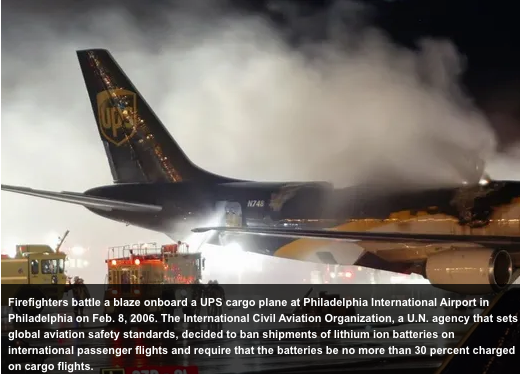There have been a number of serious aircraft accidents attributed to Lithium-ion Cells and / or Batteries catching fire while in transit. This has led to the International Air Transport Association (IATA), in association with Battery Researchers and Manufacturers, promulgating strict Rules for the carriage of such items. These Rules have also carried over to Postal Authorities throughout the world who can never be sure that Postal Items containing Lithium-ion products may or may not be carried by air during some part of their journey.
IATA Rules which states as follows:
"Lithium ion batteries packed by themselves i.e., not contained in or packed with equipment must be shipped at a State of Charge (SoC) not exceeding 30% of their rated capacity. Cells and / or batteries at a SoC of greater than 30% may only be shipped with the approval of the State of Origin and the State of the Operator under the written conditions established by those authorities".
So, the short answer to the question is, “For reasons of Safety”.
IATA Dangerous Goods Regulations for the shipment of lithium-ion batteries by air:
In case of air transportation of your LiBs, you are required to meet the Dangerous Goods Regulations (DGR) issued by The International Air Transport Association, (IATA).
According to the register of Dangerous Goods in the DGR, Lithium-ion batteries are classified in Class 9 – Miscellaneous dangerous goods as either of:
UN 3480, Lithium-ion batteries
UN 3481, Lithium ion batteries contained in equipment; or
UN 3481, Lithium ion batteries packed with equipment.
This article focuses solely on shipping LiBs that are packed by themselves, therefore defined as UN3480. If we check out UN3480 in the register of dangerous goods in the DGR 58, we find that for this category, 8 special provisions and 1 packing instruction apply;
Special Provisions applicable to UN3480
A88: this provision details air shipment of lithium-ion battery prototypes
A99: lithium-ion batteries over 35 kilograms; these are to be approved by a national authority.
A154: lithium-ion batteries that are identified as defective for safety reasons or have been damaged, are forbidden for air transport
A164: an electrical battery that has the potential of dangerous evolution of heat, must be prepared for transport so that short circuit is prevented
A183: waste batteries (shipped for recycling) are forbidden from air transport unless approved by an appropriate national authority of the State of Origin of the transport, and the State of the operator responsible for transportation: the airline. So if you want to fly a waste battery from Germany on a Chinese aircraft, you need the approval of authorities in both states.
A201: As transportation of lithium-ion batteries on passenger aircrafts is basically prohibited, only cargo aircrafts may be used. This Special Provision regulates how a state — through its competent authority — can approve a deviation.
A206: this provision details the use of new and old version of hazard labels
A331: According to UN3480, “lithium-ion cells and batteries must be shipped at a state of charge (SoC) not exceeding 30% of their rated design capacity.” Exceptions can be made, however, according to special Provision A331. It states that with the approval of the State of Origin and the State of the Operator under the written conditions established by those authorities, deviating from the 30% maximum charge SoC can be allowed.
To compliantly ship LiBs by air, all packages must also be prepared in accordance with Packing Instruction 965.
In addition. The best state for a lithium ion battery is between 20% and 90% charged. At 100% charge, the batteries degrade faster. It is also bad to completely discharge them. Batteries will lose charge over time.





